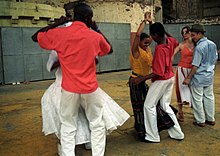
Umbigada (from Portuguese umbigo, "navel"), sometimes translates as "belly bump" or "belly blow", is a dance move in various Afro-Brazilian dances. It is seen as a "basic feature of many dances imported to Brazil and Portugal from the Congo-Angola region", for example, samba, fandango, batuque, creole drum.
It is performed as follows: a dancer opens her arms and extends her navel towards another dancer. The bodies of the two dancers may, or may not touch.
It is commonly used as an invitation to dance, e.g., during samba de roda ("samba in circle"). However it may also constitute an element of the dance itself.
References
- Danças Brasileiras - Batuque Paulista - #Brincanteemcasa (in Brazilian Portuguese), retrieved 2022-12-08
- ^ Budasz, Rogério (February 2007). "Black guitar-players and early African-Iberian music in Portugal and Brazil". Early Music. 35 (1): 3–21. doi:10.1093/em/cal117.
- ^ Chapter XXII: Umbigada (pp. 130-141 in: Luís da Câmara Cascudo, Made in Africa, pesquísas e notas, 1965, and later editions (CÂMARA CASCUDO, Luís da. Made in Africa. São Paulo: Global Editora, 2001; por Camila Lembo, an overview, retrieved May 23, 2016)
- ^ Waddey 1981, p. 255.
- "A UMBIGADA EM FILEIRA", Jangada Brazil, no. 40, December 2001
Bibliography
- Ralph Waddey, "Viola de Samba" and "Samba de Viola" in the "Reconcavo" of Bahia (Brazil) Part II: "Samba de Viola", Latin American Music Review / Revista de Música Latinoamericana, Vol. 2, No. 2 (Autumn - Winter, 1981), pp. 252-279doi:10.2307/779940
This Brazilian arts article is a stub. You can help Misplaced Pages by expanding it. |
This dance-related article is a stub. You can help Misplaced Pages by expanding it. |